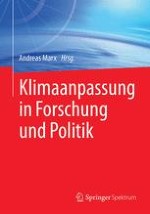2017 | OriginalPaper | Buchkapitel
2. Anpassung an den Klimawandel. Herausforderungen an Politikberatung
verfasst von : Silke Beck
Erschienen in: Klimaanpassung in Forschung und Politik
Verlag: Springer Fachmedien Wiesbaden
Aktivieren Sie unsere intelligente Suche, um passende Fachinhalte oder Patente zu finden.
Wählen Sie Textabschnitte aus um mit Künstlicher Intelligenz passenden Patente zu finden. powered by
Markieren Sie Textabschnitte, um KI-gestützt weitere passende Inhalte zu finden. powered by
